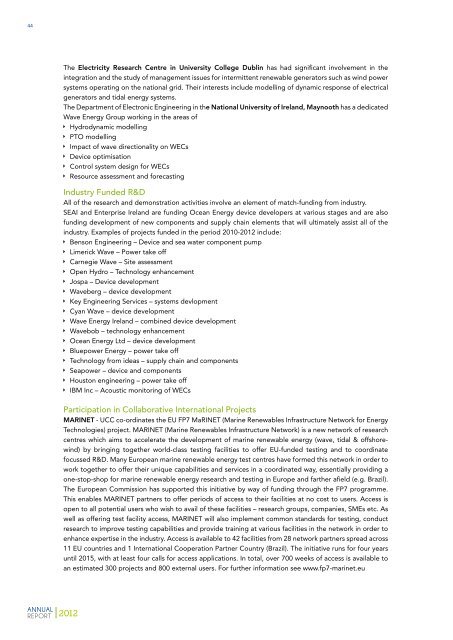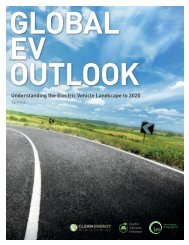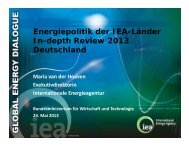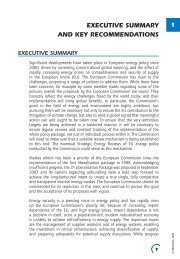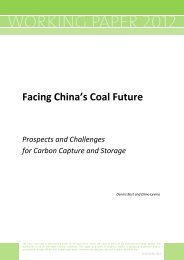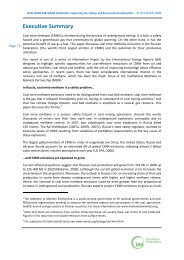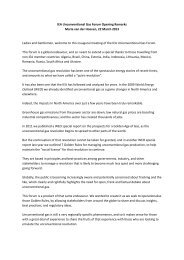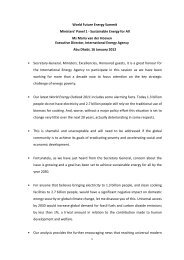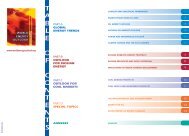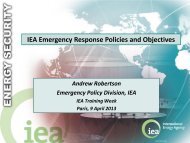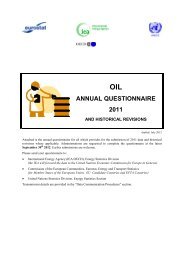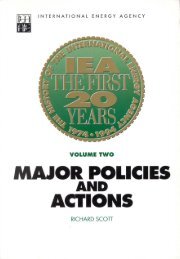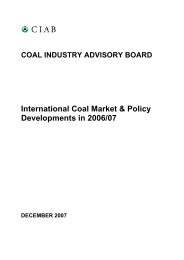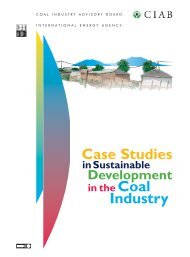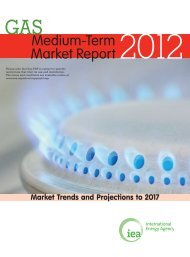OES Annual Report 2012 - Ocean Energy Systems
OES Annual Report 2012 - Ocean Energy Systems
OES Annual Report 2012 - Ocean Energy Systems
You also want an ePaper? Increase the reach of your titles
YUMPU automatically turns print PDFs into web optimized ePapers that Google loves.
44<br />
The Electricity Research Centre in University College Dublin has had significant involvement in the<br />
integration and the study of management issues for intermittent renewable generators such as wind power<br />
systems operating on the national grid. Their interests include modelling of dynamic response of electrical<br />
generators and tidal energy systems.<br />
The Department of Electronic Engineering in the National University of Ireland, Maynooth has a dedicated<br />
Wave <strong>Energy</strong> Group working in the areas of<br />
ÌÌ<br />
Hydrodynamic modelling<br />
ÌÌ<br />
PTO modelling<br />
ÌÌ<br />
Impact of wave directionality on WECs<br />
ÌÌ<br />
Device optimisation<br />
ÌÌ<br />
Control system design for WECs<br />
ÌÌ<br />
Resource assessment and forecasting<br />
Industry Funded R&D<br />
All of the research and demonstration activities involve an element of match-funding from industry.<br />
SEAI and Enterprise Ireland are funding <strong>Ocean</strong> <strong>Energy</strong> device developers at various stages and are also<br />
funding development of new components and supply chain elements that will ultimately assist all of the<br />
industry. Examples of projects funded in the period 2010-<strong>2012</strong> include:<br />
ÌÌ<br />
Benson Engineering – Device and sea water component pump<br />
ÌÌ<br />
Limerick Wave – Power take off<br />
ÌÌ<br />
Carnegie Wave – Site assessment<br />
ÌÌ<br />
Open Hydro – Technology enhancement<br />
ÌÌ<br />
Jospa – Device development<br />
ÌÌ<br />
Waveberg – device development<br />
ÌÌ<br />
Key Engineering Services – systems devlopment<br />
ÌÌ<br />
Cyan Wave – device development<br />
ÌÌ<br />
Wave <strong>Energy</strong> Ireland – combined device development<br />
ÌÌ<br />
Wavebob – technology enhancement<br />
ÌÌ<br />
<strong>Ocean</strong> <strong>Energy</strong> Ltd – device development<br />
ÌÌ<br />
Bluepower <strong>Energy</strong> – power take off<br />
ÌÌ<br />
Technology from ideas – supply chain and components<br />
ÌÌ<br />
Seapower – device and components<br />
ÌÌ<br />
Houston engineering – power take off<br />
ÌÌ<br />
IBM Inc – Acoustic monitoring of WECs<br />
Participation in Collaborative International Projects<br />
MARINET - UCC co-ordinates the EU FP7 MaRINET (Marine Renewables Infrastructure Network for <strong>Energy</strong><br />
Technologies) project. MARINET (Marine Renewables Infrastructure Network) is a new network of research<br />
centres which aims to accelerate the development of marine renewable energy (wave, tidal & offshorewind)<br />
by bringing together world-class testing facilities to offer EU-funded testing and to coordinate<br />
focussed R&D. Many European marine renewable energy test centres have formed this network in order to<br />
work together to offer their unique capabilities and services in a coordinated way, essentially providing a<br />
one-stop-shop for marine renewable energy research and testing in Europe and farther afield (e.g. Brazil).<br />
The European Commission has supported this initiative by way of funding through the FP7 programme.<br />
This enables MARINET partners to offer periods of access to their facilities at no cost to users. Access is<br />
open to all potential users who wish to avail of these facilities – research groups, companies, SMEs etc. As<br />
well as offering test facility access, MARINET will also implement common standards for testing, conduct<br />
research to improve testing capabilities and provide training at various facilities in the network in order to<br />
enhance expertise in the industry. Access is available to 42 facilities from 28 network partners spread across<br />
11 EU countries and 1 International Cooperation Partner Country (Brazil). The initiative runs for four years<br />
until 2015, with at least four calls for access applications. In total, over 700 weeks of access is available to<br />
an estimated 300 projects and 800 external users. For further information see www.fp7-marinet.eu<br />
ANNUAL<br />
REPORT <strong>2012</strong>


